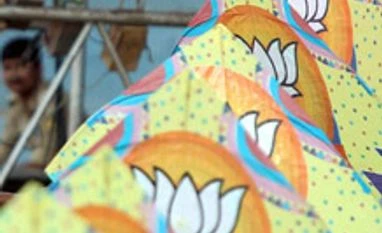The lack of consensus within the BJP was laid bare in Parliament last week during the discussion on the Food Security Bill in the Lok Sabha. In spite of Gujarat Chief Minister Narendra Modi’s criticism of the Bill, former finance minister Yashwant Sinha saying the Bill was bad for the economy, and BJP leaders terming it ‘weak’, ‘half-baked’ and one ensuring ‘vote security’ rather than food security, the party ended by supporting the government. In Chhattisgarh, the BJP was praising its own version of the food Bill.
Foreign direct investment (FDI) is another issue where the main opposition party’s stand is tenuous. Although the National Democratic Alliance’s (NDA) 2004 manifesto talked about allowing 26 per cent FDI in retail, the BJP is now bitterly opposed to it. However, party leaders refuse to commit themselves on whether they will roll back the provisions of the Fema (Foreign Exchange Management Act) regulation if they come to power. Fema, which is crucial in rolling out FDI in retail, will be debated in the Rajya Sabha next week.
Speaking at the Confederation of All India Traders in March, leader of the Opposition in the Rajya Sabha Arun Jaitley had said the BJP would oppose FDI in retail “Till our last breath”. However, on specifically asked whether the BJP would overturn the FDI policy if voted to power, Gopal Agarwal, head of BJP’s economic cell says, “In the present policy, agriculture and manufacturing are not at level-playing field; employment generation (from liberalisation of retail) is low and supply chains are not being exposed to investments. We will bring amendments on these issues.”
Agarwal agrees the party lacks a consensus on reforms. Although the National Democratic Alliance during its tenure promoted FDI, the BJP has opposed the government in increasing FDI in the telecom and insurance sectors.
Jagdish Shettigar, who was till recently one of the BJP’s economic advisors, says the party’s opposition to government on most economic issues is driven by ‘narrow politics’.
“I felt suffocated,” says Shettigar on why he left the BJP. “Till coming to power in 1998, the BJP was a responsible Opposition. Problems started soon after the 2004 election defeat and they began indulging in narrow politics. Now, they even oppose some decisions, which the NDA took, such as opening up the FDI and raising petrol prices.”
While it is still early days to work out what the party’s economic manifesto will look like, most leaders say it will be more ‘inclusive’ than its 2004 version. The party has started organising brainstorming sessions with retired secretaries to the government, institutional experts and its own ministers during the NDA rule. A member of this group, who does not want to be identified, tells Business Standard the party’s core ideologues are deeply critical of legislation such as the Mahatma Gandhi National Rural Employment Guarantee Act because “not just poverty reduction, but growth is equally important”. He said a programme that neither employs machinery nor creates durable assets, is equivalent to a dole and can never succeed in driving out poverty, and will merely create another contractor class. The food security law will only result in bringing down agricultural productivity as the subsistence farmer will see no reason to work, given that subsidised grain will become so cheap. However, he acknowledges the difficulties in rolling back these legislations.
According to him, the BJP's economic outlook will be ruled by two mantras: urbanisation and the growth of new cities, and the need to replace fossil fuel by renewable energy, especially solar energy. Piyush Goel says the BJP might now concentrate on what he terms “low-hanging fruits”. Goel says that India's tourism and civil aviation strengths need to be exploited and these require only minimal investment. Upgradation of airports needs minimal investment, requires no additional land acquisition and can profitably spun off into profit-making entities quickly.
Overall, the BJP is yet to spell out is single big idea for economic policy. “We believe in continuity with change. What was relevant in 2004 may not be relevant in 2014,” says Vinay Sahasrabuddhe, who is working on BJP’s vision document and was a political advisor to Nitin Gadkari when the latter was BJP president.
)